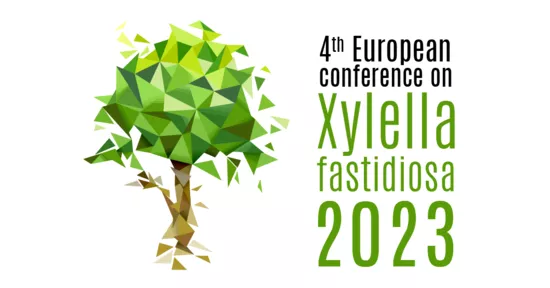4th European conference on Xylella fastidiosa: researching sustainable solutions

Background and topic
The 4th European conference on Xylella fastidiosa was held in Lyon (France) on 20 August 2023, as a satellite event of the International Congress on Plant Pathology (ICPP2023). It brought together around 300 researchers, risk assessors, risk managers and stakeholders in person and online to discuss the results from research that has taken place since X. fastidiosa was first detected in Europe in 2013. Read the post event announcement.
Organised by EFSA with the active contribution of the major EU and transnational research initiatives on X. fastidiosa (BeXyl, BIOVEXO, ERC MultiX and EUPHRESCO), the conference was chaired by Blanca B. Landa, who coordinates the EU funded project BeXyl (Beyond Xylella), and Giuseppe Stancanelli, who leads the Plant Health Risk Assessment team at EFSA. The Scientific Committee of this conference included scientists from all the partner organisations and external reviewers.
The presentations and discussions took stock of the results from research that has taken place over the last decade. Two major research projects[1] funded by the European Union have filled knowledge gaps on the distinctive elements of the outbreaks, consolidated a robust network for monitoring and testing, and produced results that have supported and influenced the activities of researchers, stakeholders and policy makers.
Objectives of the event
The programme reflected the progress of the multidisciplinary research conducted and discussed the scientific approaches to develop and test practical and applicable solutions for the control and sustainable management of X. fastidiosa outbreaks in the EU.
The conference sessions and discussions covered the latest findings, data and knowledge on X. fastidiosa, including:
- Pathogen biology, ecology and genetics;
- Epidemiology and modelling of X. fastidiosa diseases;
- Host plant-interactions and resistant/tolerant plant germplasm;
- Surveillance and early detection tools;
- Vectors biology and sustainable control strategies;
- Endophytic microbial resources for X. fastidiosa control;
- Sustainable and integrated pest and disease management strategies for prevention and reduction of the impact of X. fastidiosa diseases.
Programme - Sunday, 20 August 2023
SESSION 1: Current status and research updates on Xylella fastidiosa in the EU (video recording)
Stancanelli Landa: Welcome and brief introduction to the conference
Marquez Garcia: Current pest status of X. fastidiosa in the European Union
Boscia: The current status of X. fastidiosa in Salento (Italy)
SESSION 2 – Latest findings on Xylella fastidiosa resistance and control (video recording)
Stancanelli: How many plant species can Xylella fastidiosa infect?
SESSION 3 - Xylellafastidiosa vectors biology (video recording)
Bodino: Reproductive biology and egg parasitoids of Philaenus spumarius
SESSION 4 - Tools for Xylellafastidiosa surveillance and detection (video recording)
Cendoya: Evaluation of outbreak response plans for X. fastidiosa in Alicante, Spain
CLOSING REMARKS (video recording)
Book of Abstracts
Young Researchers' Initiative
The Young Researchers’ Initiative was designed to support early-career researchers and plant health professionals, by covering accommodation and travel costs to attend the conference.
EFSA has selected 13 researchers for this initiative, hailing from Europe, America, and Asia. To be considered, participants needed to be a presenter of an accepted oral or poster presentation, be either a PhD student or an early career researcher/plant health professional, and be affiliated with a public institute or higher education institute.
Contact
Should you have any questions related to the content or organisation of the 4th European conference on X. fastidiosa please contact us at: xylella_conference [at] efsa.europa.eu (xylella_conference[at]efsa[dot]europa[dot]eu)
